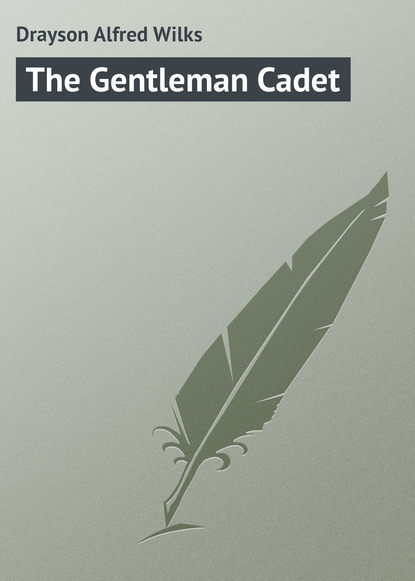По всем вопросам обращайтесь на: info@litportal.ru
(©) 2003-2024.
✖
The Gentleman Cadet
Настройки чтения
Размер шрифта
Высота строк
Поля
When we pulled up, Brag said, “By George, you can run! Let me get my wind, and then see if you can give me ten yards in one hundred and twenty.”
After a few minutes, Brag announced himself ready, and, having measured ten good paces, we started at “One, two, three, and away!” and commenced our second trial. Not being able to see the handkerchiefs till near them, I did not know how to arrange my speed. I, however, caught and passed Brag, and won by about two yards.
“I don’t think there is anything the matter with me,” said Brag, “and I believe I’ve run all right; and if so, you’ve a tremendous turn of speed. Now, you keep quiet about this, and I’ll have some fun.”
We went again to our rooms, and Brag recommenced his work and said nothing to Snipson about our trial race.
On the following morning we had examinations, and those who had finished their papers came out of academy. There was no drill, so the cadets were scattered about the parade kicking the football and trying to kick it against the face of the clock. I was looking on at this, and watching for a chance of a kick, when I heard one old cadet call out to another, —
“There’s going to be a race soon?”
“Is there?” replied the cadet spoken to. “Yes, Brag says he’s got a neux he will back for one hundred and twenty yards against Horsford, if he will give the neux five yards’ start.”
“Who is the neux?” inquired the cadet. “I believe it’s Brag’s own neux – young Shepard.”
“Oh, he’s too short to run! Horsford will lick his head off! Here comes Brag?”
I now saw Brag and about twenty old cadets coming from the library, and my name was soon called. I went up to Brag, who said, —
“Shepard, you’ve to run a race for me, and if you don’t win I’ll scrag you! It’s one hundred and twenty yards, and you get five yards’ start.”
I asked leave to go to my room to get a pair of light shoes to run in, and, on coming out, found Horsford with flannel trousers on, and all ready for the race. By this time all the cadets had come out of academy, and as any excitement was welcome, they all assembled on parade and made two lines, between which we were to run. The distance was carefully measured off, and I was placed five yards in front of Horsford.
“Now mind your laurels, Horsford!” said one of his backers; “don’t shave it too close!”
“I can manage this lot, I think,” he replied.
“Shepard, you’ll get a licking if you’re beaten!” said a cadet near.
“Who is backing Shepard?” inquired some old cadets.
“Only Brag,” was the reply. “He’s got an idea that Shepard can run, from some trial he had with him, but no one ever heard of Shepard as a runner. Brag has two or three pounds on the race, and I wouldn’t be Shepard for something, for Brag will vent his disappointment on him.”
During this conversation, which I overheard, several cadets had cleared the course and made a line of handkerchiefs at the winning-post, whilst I toed a line five yards before Horsford. I kept taking long breaths so as to oxygenise my blood well, for I hoped to run the whole distance without taking breath. I felt great confidence in myself, because in the races for the bat I fancied I was more speedy than Horsford; for I did not imagine that he was concealing his speed for any purpose, so I saw no reason to doubt the result.
Everything being ready, the word “Off!” was given, and away I went. I was very quick at starting, and got well on my legs at once. I could have run the whole distance at speed, but for the first sixty yards I did not do all I knew. I dared not look round, for I had read in sporting works that many races had been lost by doing so, so I could not tell whether Horsford was near me. At about thirty yards from home, however, I could feel that my opponent was close to me. There were shouts of “Go it, Horsford!” “Run, little ’un!”
“Now for it, Horsford?” which showed me he was close to me; so, bracing myself up, as it were, I dashed on with all my speed and carried away the line of handkerchiefs on my chest.
Brag rushed up to me, and patted me on the back and said, —
“Bravo, youngster! you won cleverly.”
As I walked back to the winning-post I was the centre of curiosity. All the old cadets were staring at me, and I could not help feeling a certain amount of pride in having won this race. I had been so bullied and snubbed as a last-joined neux that all the conceit was taken out of me, and I felt regularly cowed, so that a triumph like the present was quite refreshing to me. The remarks of the old cadets, too, were amusing; for it was the general opinion that I looked less like a runner than any boy they had ever seen, as I looked delicate and was short.
That evening, in our room, Brag was very civil, and even Snipson seemed to think more of me than he did before. When Snipson left the room, which he did to go to the library, Brag asked me if I thought I had won my race easily.
I replied that I had, and added, “You won’t think me conceited, I hope, if I say I am tolerably sure I can beat Horsford even.”
“How can that be,” said Brag, “when you won by only a yard?”
“Because I ran slowly the first part of the race, wanting to try my speed in the last part, and I am certain at about sixty-five yards Horsford was not a foot behind me.”
“Ah! you can’t beat Horsford even,” replied Brag; “he’s got so much longer a stride than you.”
“Well, I believe I can.”
“Horsford says to-day he was out of form, or else he could have won, so perhaps you may have another turn with him. I’ll back you at five yards, but not at evens.”
I met Horsford in the library next day, and he said, —
“You were in great form yesterday, and I was out of sorts, but I didn’t know you were such a runner. We must have another spin after the examinations are over, and I’ll see if I can’t turn the tables on you.”
I told Brag of this remark, and he replied that he would back me again, but recommended me not to eat too much pastry and “soft tack,” or I should get out of form.
The examination now went on every day, and I felt I was not doing well. Any way, if I passed out of the junior class I should be satisfied. I found that those boys who had been long at preparatory schools had an advantage over me in knowing languages better than I did. French and German were the only two languages we then learnt at the Academy, and the curious system then was for the professors at the Academy to teach also at the Woolwich cram-schools. A boy who had, therefore, been for a couple of years at a Woolwich school, and in the first class, knew well and was known by the professors of French and German, whereas one who had been trained as I had did not derive the benefit of the former instruction of the professors. It was supposed in those days that if we did not know languages when we joined the Academy we did not pick them up there. This might be explained from the fact that so much individual and personal instruction is required in order to teach languages, and there was only one professor to about thirty-five cadets.
Day after day the examination continued, and I worked on, and at length, all being finished, there were about five days during which the results of the examination were being made up, and we had nothing to do but drill. This gave us plenty of spare time, and we had games of football, and various matches at rackets and other games. Several cadets, however, who had lost their half-crowns in the race between Horsford and myself, were anxious to recover these, and there were many opinions about our relative merits in running. I heard from some of my own batch that it was the general opinion that if Horsford gave me three yards out of one hundred, it was a certainty for him.
D’Arcy, however, had told the head of his room that he thought I could win at these odds, and I also told Brag I would go halves with him in anything he bet at those odds. A match of this kind caused much interest, and several cadets were interested in the proposed race. I heard that Horsford had been quietly training, in order to get himself into form, and that he had said it was a certainty, as he was seedy when he ran with me, and was called upon all of a sudden to run.
Brag said he did not like the match much, but still, having won, he would give the losers a chance.
It was decided that we should run on the centre parade in the afternoon, and the whole Academy turned out to witness the match. I had carefully practised of an evening, both starting and running, and I could feel I was going very well. As I ran, I found I could pick up my feet quickly, and could, as far as it was possible to judge, run better than I ever ran. It occurred to me that if I could beat Horsford at these odds I would run him even, and a feeling of ambition came over me that it would be something for a neux to be the best runner at the Academy.
The afternoon at length came of the day on which the match was to come off, and all the cadets who could come out came on the centre parade. I had taken the precaution of putting on a pair of loose, plain trousers, and rather tight shoes that I fancied I could run in well. Just as we were assembling, the Captain of the Cadet Company entered the inclosure and inquired what all the assembly was about. He was informed it was for a race, so, being a great advocate for athletic competitions, he stopped to see the match.
Horsford, I could see, was in earnest now, and had taken the same precautions that I had. He was dressed in complete running costume – a suit in which he had won several races at Rugby, from which school he had come to Woolwich.
All the preliminaries having been arranged, we were placed at our respective scratches – I having three yards’ start.
I had ascertained that there were five inches difference in our height – at that time Horsford being five feet six, and I only five feet one – but I believed I had as long a stride as he had, and was as quick on my legs.
On the words, “Are you ready?” being asked, I got all my weight on my rear leg, and, bracing myself up, was prepared for “Off!”
At the first trial we were off, and I ran as nearly as possible at full speed. I knew I could go a little, though not much, quicker than I was going, so I kept on till about twenty yards from goal. I then glanced round, and found Horsford quite two yards behind me, so I maintained the same pace, and came in a winner by about a yard and a half.
The cadets who had lost on this race at once went to Brag and said, “Shepard is too good, you know. Horsford can’t give him these three yards’ start. Let them run a race even, and we’ll back Horsford at two to one.”
Brag looked at me inquiringly, so I gave him a nod, and he at once said, “All right. I dare say I shall lose, and I only bet just to give you a chance.”
The idea now came across me that if I won this race I should be the acknowledged best runner at the Academy for a short distance. There was something pleasing to me in this idea, for I then discovered that I had ambition – and what is a boy or a man without?
The individual who cares not whether he win or lose in any competition is a poor creature. He who is not to a certain extent downcast by defeat, or elated by a success, is not a man who will ever rise to eminence, for he will never use the exertion necessary to obtain success. In almost every case victory is obtained only by thought and care, expended by those who possess some special gifts of nature; and, although there is no reason why we should be unduly elated by any success, still one’s self-love is gratified if we find we succeed above others.
I was of course the hero of the day now that I had beaten Horsford, for I heard he had run races with several old cadets and had won all these, so I longed to try conclusions with him at evens. D’Arcy came to me and said, “If you run the whole distance at that speed, I know you’ll win, so go in at it in earnest.”
This race was considered a hollow affair, as it was supposed that my opponent could not pull up a losing race, but could run well at evens. It was supposed that Brag bet on this just to give the losers back some of the shillings they had lost; it was not supposed I had a chance.









